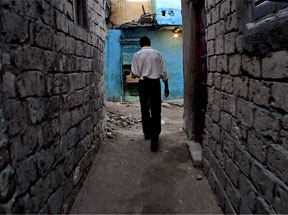What Is to Be Done?
Que faire? FRANCE / 2010 / Arabic / Color / Blu-ray (SD) / 152 min
FRANCE / 2010 / Arabic / Color / Blu-ray (SD) / 152 min
Director, Photography, Script: Emmanuelle Demoris
Editing: Emmanuelle Demoris, Céline Ducreux
Sound: Emmanuel Croset, Jean-Luc Audy
Producer: Jean Gruault
Production Company: Les films de la Villa
Mafrouza is a slum town near Alexandria Port, Egypt. The camera tells an everyday story, entering its narrow maze-like alleyways and inviting the viewer to experience the gentle flow of time there by wandering around the town to meet the residents. An elderly man troubled by flooding in his home; young people who sing and dance in the streets at night; the proprietor of a grocery who preaches at a mosque; people who indulge themselves on the beach in late summer. We silently lend an ear to their views on life, passion, and their relationships with the world outside, often expressed with a cup of tea or cigarette in one hand. Everything evokes the joy of living. This film is the third part of a five-part work, Mafrouza.
[Director’s Statement] Meeting the people of Mafrouza is a striking experience. I have rarely seen people who appear to fight off so much fear and sadness. Facing a scenery that embodies disaster, they find it in themselves to laugh, to take a true interest in others. As if some characters from a Beckett play suddenly decided that they might as well laugh it off. They seem to be driven by an unbelievable strength for living, something like a crazy and inventive capacity for happiness that goes hand in hand with their freedom in words and thoughts, in body language, too.
That is why I decided to devote a film to Mafrouza and filmed there over two years. It took time to chase away generalizations and clichés and really meet the people. We spoke as much of them as of myself, of cinema and of life. Over many months, we shared our questions, angers, and desires, creating a space of freedom where we built the film together. And as the camera acts as a full character off-screen, this encounter of ours appears in the film. Its process led us to question the way we all look at one another.
The duration of the five parts of Mafrouza enables the polyphonic chronicle to address its complex universe to the freedom of the viewer. The unpredictable inventiveness of the people in Mafrouza echoes my own concern with making films that show the complexity of the world, not protecting us from it or masking its disorder, but making us see how this complexity is the very condition of life.
 Emmanuelle Demoris
Emmanuelle Demoris
Born in London in 1965, Emmanuelle Demoris studied literature and art history in Paris before entering the FEMIS cinema school. She first worked in theater as a director and actor (notably in Ô douce nuit! by Tadeusz Kantor). In 1998, she directed a documentary film, Mémoires de pierre, about the past and the present of a stone quarry near Paris. In 1999, with the support of a Villa Médicis grant, she spent a year traveling in the Mediterranean area to take filmed notes for a film about the relationships of the living with the dead. This journey led her to the Mafrouza neighbourhood in Alexandria, where she started the Mafrouza film project in 2001. She also worked as a scriptwriter, which is how she met Jean Gruault, a screenwriter himself and now producer of Mafrouza, for the needs of which he founded the Films de la Villa company. |
